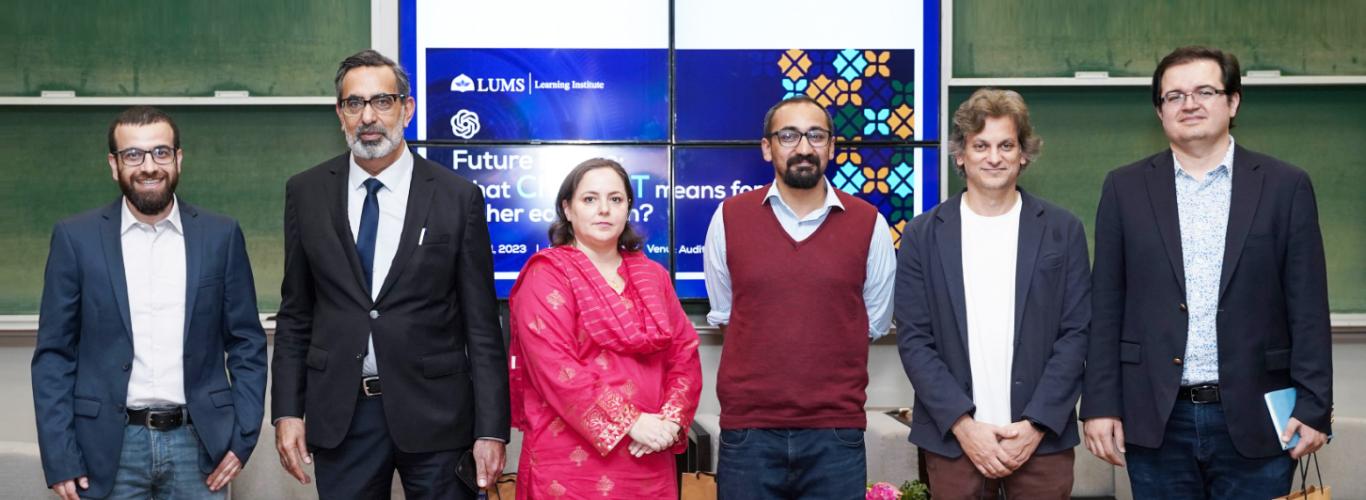LUMS Learning Institute Holds an Insightful Discussion on the Future Implications of ChatGPT
The LUMS Learning Institute held a panel discussion on March 1 to address the increasing impact of ChatGPT on academic research, challenges to learning assessment, industry, and the university at large. The insightful panel discussion, ‘Future is here: what ChatGPT means for higher education?’ revolved around the future of Artificial Intelligence (AI), the impact of ChatGPT on higher education in Pakistan and how AI might change the way we learn and teach. Ethical concerns such as the issue of plagiarism, citing sources and the use of judgement to sift through information were highlighted to showcase the need to operate such software with due diligence.
The interactive conversation featured a panel of esteemed guests, with a special seat reserved for ChatGPT itself! The panelists included Dr. Arshad Ahmad, Vice Chancellor; Dr. Jessica Albrent, Assistant Professor, Research Methods/Design Thinking; Dr. Nauman Faizi, Assistant Professor, Religion; Dr. Ihsan Ayyub Qazi, Associate Professor, Computer Science, and industry expert, Mr. Yasser Bashir, CEO, Arbisoft. The session was moderated by Dr. Muhammad Hamad Alizai, Associate Professor, Computer Science and Director, LUMS Learning Institute.
The conversation began with Dr. Qazi explaining how the software is intellectually contributing to meet present-day research and academic needs and is helpful in accessing and providing quick information.
Dr. Jessica Albrent pointed out that while GPT provides all kinds of information, it is machine-controlled and automated and may or may not provide information that is relevant and serves the purpose. Moreover, she emphasised that learners with low language interpretation skills, might not be able to exercise their judgement to determine the difference between relevant and irrelevant content. "As humans have evolved, so has learning. Now there are different stages of learning; remembering and understanding are its lowest level," she explained.
As the discussion progressed, Dr. Ahmad reinforced that humans are distinctly different from machines in the sense that they can exhibit emotions and operate on empathy, whereas machines are not capable of displaying the same characteristics. While emphasising the constraints of manmade machines/software, he said, “ChatGPT is artificial intelligence; people focus on intelligence while overlooking the artificial component. At the end of the day, it is an algorithm designed to achieve outcomes that can be predicted and thus is contained."
Mr. Bashir and Dr. Faizi discussed the limitations of the software at length, terming it as ‘yet another plagiarism tool.’ Mr. Bashir, further stated, “Use it as an aid or a prompt rather than trying to complete your tasks with it. Relying on it would not achieve the right outcome.”
While the software is valuable for learners including academics, students, and researchers, it also allows information to be circulated and recycled repeatedly. Another major concern is around the ChatGPT responses and how reflective they are of human biases and prejudice, considering that they are controlled by humans.
Conclusively, it was mutually agreed that AI should be used as an assistive tool for learning and not as a means of cheating the system by completely relying on it in terms of information generation. The software does not possess the critical thinking and analytical skills required to differentiate between accuracy and relevancy. In addition, research studies need to be conducted on the usage of ChatGPT, exploring limitations, and conducting a fact-checking study to ensure that material produced and recycled through the platform is originating from credible sources.
The panel discussion was followed by an interactive question and answer session, where pertinent concerns and interesting observations were shared by the audience.
The video recording of the event can be accessed here.























